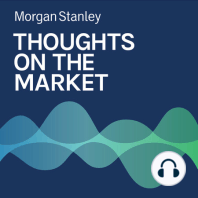4 min listen

European Markets React to Upcoming U.S. Election
European Markets React to Upcoming U.S. Election
ratings:
Length:
9 minutes
Released:
Apr 24, 2024
Format:
Podcast episode
Description
As the U.S. presidential election remains closely contested, our experts discuss what a change in administration could mean for European equities in terms of trade, China relations and other key issues.----- Transcript -----Michael Zezas: Welcome to Thoughts on the Market. I'm Michael Zezas, Global Head of Fixed Income and Thematic Research.Marina Zavolock: And I'm Marina Zavolock, Chief European Equity Strategist.Michael Zezas: And on this episode of Thoughts on the Market, we'll discuss how the U.S. election could impact European markets.It's Wednesday, April 24th at 10am in New York.Marina Zavolock: And 3pm in London.Michael Zezas: As the U.S. presidential election gets closer and the outcome remains highly uncertain, we're exploring the impact of a potential departure from the current status quo of President Biden in the White House. Today, my colleague Marina and I want to discuss just what that would mean for European equity markets.Marina, how closely is Europe following the election, and why?Marina Zavolock: So, European equities derive about 25 percent of their market cap weighted revenues from the U.S. And the U.S. is the largest export market for European firms outside of Europe. So, of course, interest in U.S. elections here is very high; and this is in terms of the exposures of European stocks, sectors, asset classes, and economics as a whole. European investors, I would say that their peak interest in U.S. elections was around the Republican primaries, and it's stayed elevated ever since.And Mike, I know you want to dig in specifically on how European markets would react in a change in status quo scenario. But first let's talk about your outlook on some of the key policies that may change if Biden loses the election. What are your thoughts on trade policy and tariffs?Michael Zezas: Trump's been clear about his view that countries levying higher tariffs on U.S. imports than the US levies on their imports is unfair, and he's willing to correct it with tariffs. And while in his term as president he focused more on China, he was interested in tariff escalation with Europe. But he reportedly was moved off that position by advisors and members of his own party who were wary of creating more noise in the transatlantic alliance. But this time around, the Republican party's views are much more aligned with Trump's. So, imports on European goods like autos could easily come into scope.Marina, how are you thinking about the impact of potentially higher tariffs on the European market? What sectors might be most affected?Marina Zavolock: The initial reaction to recent tariff related headlines we've been fielding from investors is around the risks to our bullish European equities view in particular. The general investor feedback we get is that European equities may continue to rally for now, but as we approach November and as we approach US elections, the downside risks from this event start to build.What our in-depth analysis demonstrates, however, is that it's far more nuanced than that. As I mentioned, Europe derives about 25 per cent of its weighted revenues from the US. But, when we've dug into that number, most of these revenues are in the form of services or local to local goods, meaning goods produced locally in the US and sold in the US -- but by European companies. Only about 6 per cent of Europe's overall weighted revenue exposure is to goods exported into the US. So, we find the risk is far more idiosyncratic from a change in tariff policy than broad based. And in terms of individual sectors most exposed to tariff risks, these include a lot of healthcare sectors -- med tech, life sciences, pharma, biotech -- aerospace as well, metals and mining; of course, autos as you mentioned, and a number of others.After tariffs, the Inflation Reduction Act (IRA) is the next most common policy area we get asked about in Europe, given relatively high exposures for European utilities, construction materials, and the capital goods
Released:
Apr 24, 2024
Format:
Podcast episode
Titles in the series (100)
Michael Zezas: Indirect Impacts by Thoughts on the Market